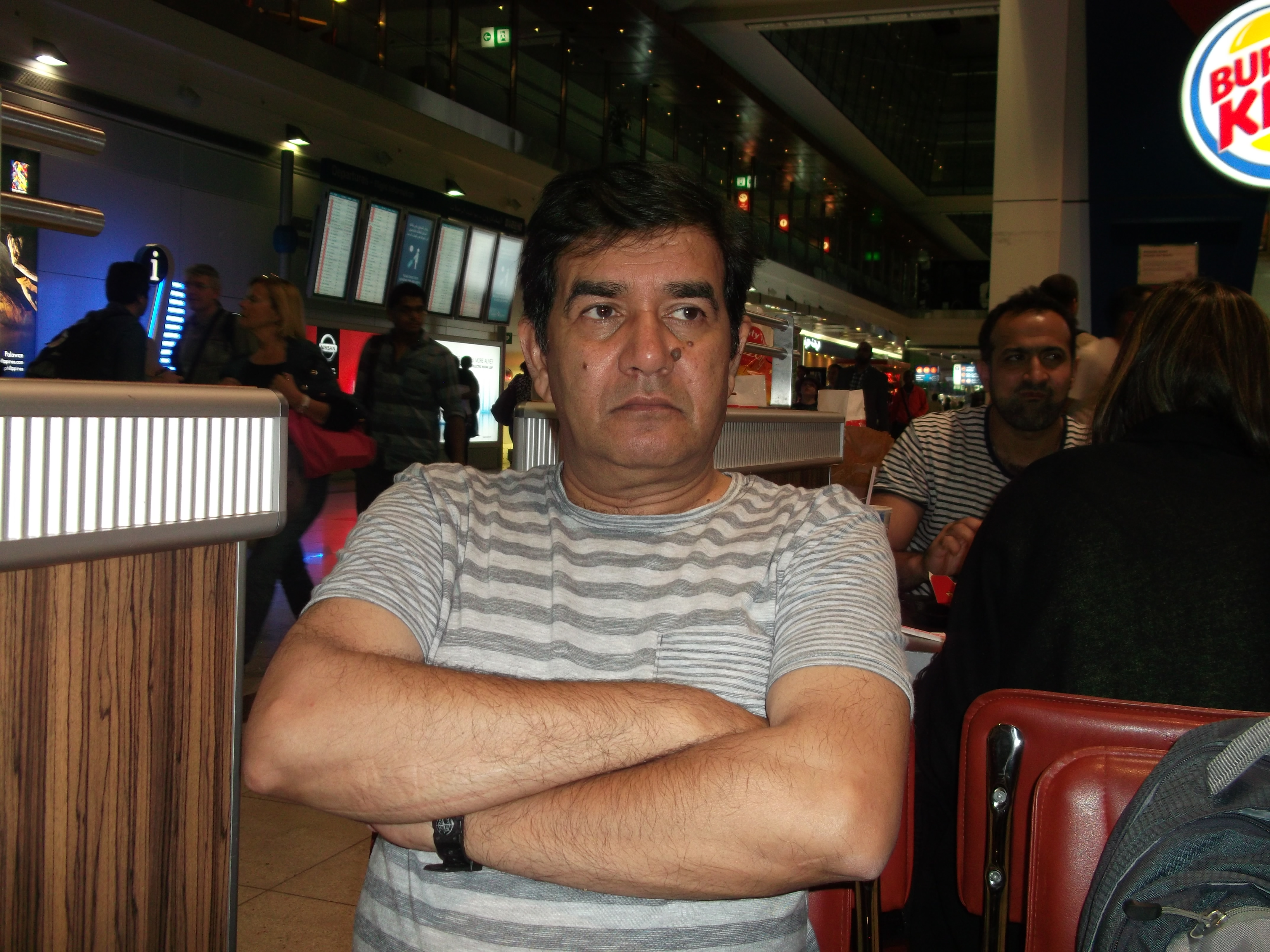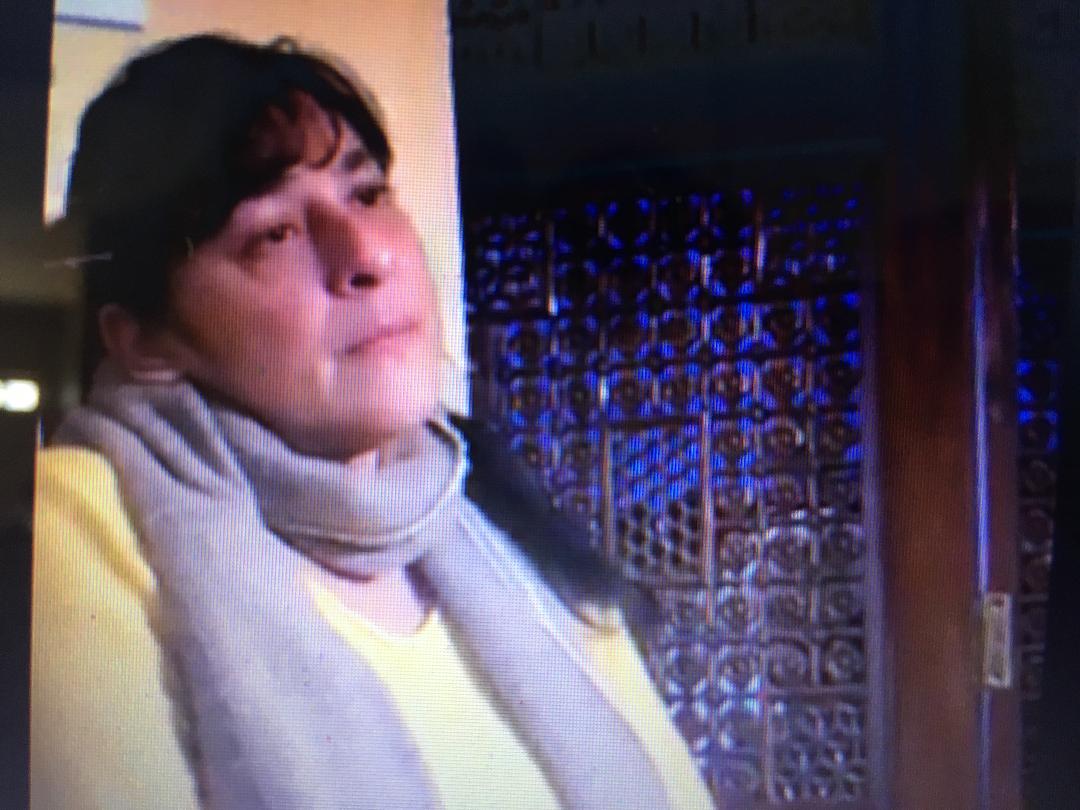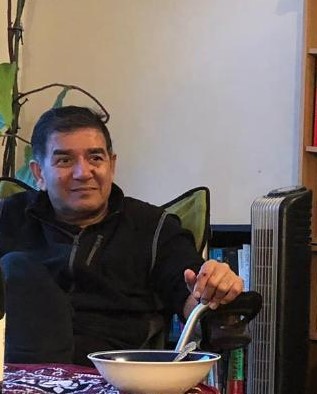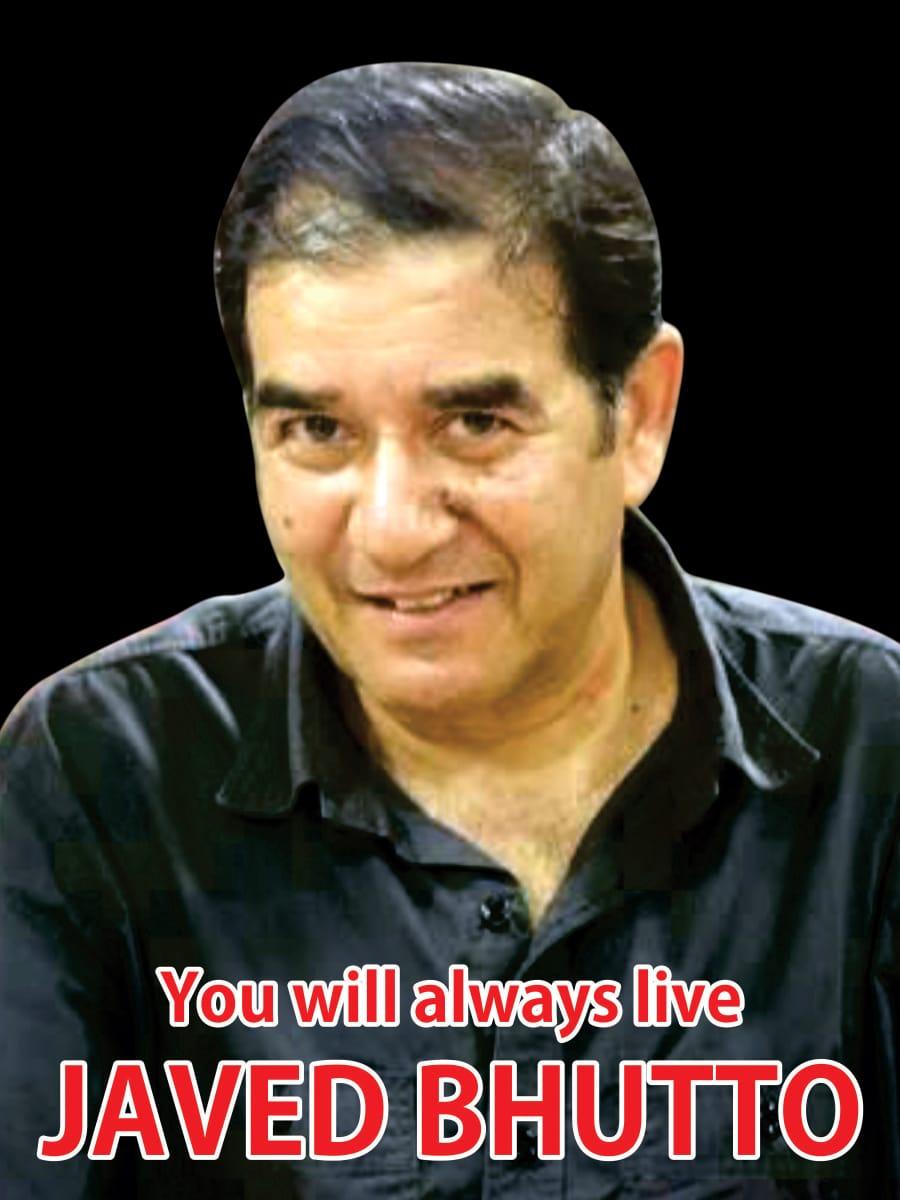After his recovery from GBS, Jawaid & I took walks in Anacostia Park to help his nerves gain full recovery. This photo was taken three weeks before the cowardly attack on him. A day before that incident on March 1, we had resolved to speed up the exercise process to help him regain full strength. It was also meant as a prelude to our trip back home.
‘Strong parallels exist between eastern Sufi and western Enlightenment thought’ – Jawaid Bhutto
Hyderabad: Sufism transcends differences based on caste, colour, creed, ethnicity, language, culture and political affiliations. It is an amalgamation of love, sacrifice, tolerance and peaceful coexistence. Sufism also possesses the enormous potential to serve as a powerful antidote against all forms extremism and terrorism.
These views were expressed by Sindh University vice chancellor Dr. Fateh Muhammad Burfat, while making his presidential speech at a special talk given by US- based Sindhi scholar and former SU Department of Philosophy chair Javed Bhutto on “Understanding Sufism”.
Dr. Burfat said that he was extremely glad to meet Javed Bhutto who was once his batchmate at Karachi University from 1976-1982.
“I am indeed delighted to be here, to meet Mr. Bhutto and to hear his erudite views on mysticism,” Dr. Burfat said.
Citing German philosopher Emmanuel Kant, Dr. Burfat said that there were strong parallels in the conceptual framework of Sufism in the east and those of enlightenment philosophers of the west.
“I understand today’s talk leaves us with a strong message to extend the borders of our love, acceptance, patience and tolerance for one another; and to extend one another honor, respect, help and cooperation.
“Today’s take-away is friendship. Sufism teaches us to ascend out of our shallow cocoons, to overpower our inflated egos, and to transcend taboos that limit our love for one another and blur our vision to see one another beyond the biases,” he stressed, adding that social media platforms had transformed traditional battle zones, and that words not bullets wounded people in modern times.
“If you want to smear anyone’s reputation or credibility today; all you need to do is to make one smart move of placing a picture, posting a status or uploading an update that ill-suits that particular person and you can have his or her image turned into tatters,” he explained.
Dr. Burfat thanked Javed Bhutto for sparing time for the talk at the varsity, complimented STAGS director Dr. Sumera Umrani for efficient coordination and arrangements; and Amar Sindhu and Dr. Ayaz Mugheri of Department of Philosophy for their collaboration.
Earlier, Bhutto said that Sufism cherished and promoted two core values of love and friendship, upon which, he said, the entire idea of world peace was based.
Bhutto said that the best of Sufi thought had spread in the world through art and literature, especially through verse, as both were the most powerful media of expression of human passions.
“Sufism is a passionate, relentless and unyielding striving of human soul to recapture its essential, original identity; to retrieve its lost innocence, glory and divine stature.
This is exactly what heroines in Shah Abdul Latif Bhittai’s verse symbolise- all six out of seven heroines tend to lapse on one account or the other like us all modern people and then go about reclaiming lost attributes. We must also endeavor to retract our essential nobility and Sufism is the path, the method and the navigation route that will take us there,” Bhutto reiterated.
Paying tribute to Allama I.I Kazi and Esla Kazi, Bhutto said both had made poetry, thought and philosophy of Shah Abdul Latif Bhittai an unwavering focus of their intellectual quest and spiritual ascend.
Bhutto thanked the Dr. Burfat, the faculty of Department of Philosophy and STAGS officials for inviting him to deliver the talk based on his scholarly engagement.
Columnist Amar Sindhu later presented a vote of thanks. The session was moderated by Dr. Sumera Umrani and Dr. Ayad Mugheri.
Published in Daily Times, April 15th 2018.
0
D.C. must do more to protect its youth.
Breon Austin’s death hit home. At 16 , he was close in age to two of my grandchildren. A young person’s death always hits hard.
To learn, however, that he lost his life after multiple bullets were fired into his body by a masked assailant in the hallway of Breon’s own home is enraging. The shooter brazenly opened fire in front of Breon’s stepfather, who had just gotten home from work, according to The Post.
Police are searching for a man wearing a black mask and black jacket in a vehicle, captured by a surveillance camera near the crime scene, “described as a gray, four-door sedan with a sun roof and stickers on the driver’s side,” The Post reported.
There’s more to be learned about the circumstances surrounding Breon’s death, but this much is certain: He was the District’s 52nd murder victim this year (as of Friday morning), a 30 percent increase over the same time in 2018. The tide of homicides in our nation’s capital keeps rising.
The vast majority of D.C. homicides, as in Breon’s case, are linked to guns. But guns don’t fire themselves. Without someone to pull the trigger, a gun is just another hunk of metal. The city is rightfully troubled by the number of guns on the streets. It also has to do something about the number of people willing and able to use them.
To be sure, there’s tangible evidence of guns aplenty on our streets. The D.C. police annually recover more than 1,500 firearms in the city.
The gun recovery campaign is continuing. From April 1 to April 22, D.C. police recovered 190 illegal firearms. We’re talking about handguns, rifles and a 12-gauge shotgun.
Get this: Over those 22 days, police arrested 11 youths in gun possession cases. Seven were 17 years old; one was 16; two were 15; and one, age 14.
An anomaly? Every good wish.
From January to March, 41 juveniles were arrested for carrying a pistol without a license, possession of an unregistered firearm or possession of unregistered ammunition.
Homicides are taking a toll on young people, too. Sixteen youths ages 1 to 19 fell victim to homicide in 2016; 12 in 2017; 21 in 2018; and four thus far this year. Those unpleasant truths are little known and little discussed.
But weeping mothers, grieving families and neighbors gathered in the cemetery know all about it. Cops and the courts know all about it. Children hearing about young bodies falling know it, too.
Sadly, the concern of people burdened by gun violence stands in sharp relief to the laser-like focus of city leaders hell-bent on greening this city’s infrastructure, making DC Circulator bus rides a freebie and expanding the line east of the river (at a $16 million cost to taxpayers), and pouring $122 million in a new K Street Transitway to make life easier, says D.C. Mayor Muriel E. Bowser (D), “for all who travel around downtown D.C.”
D.C. Attorney General Karl A. Racine (D), the District’s chief prosecutor, is one local leader who gets it. He’s also bent on finding ways to prevent juvenile involvement in crime.
Racine’s approach to violence, as he told the D.C. Council in budget hearings this week, is to view violence as a disease, and treat it “like the true epidemic that it is.”
You won’t hear many city leaders refer to D.C. violence in such life-and-death terms. Racine, however, won’t back down or give in. “The reduction of gun violence and public safety must be our number-one priority,” he told the council. “Failure to take aggressive steps to prevent violence,” Racine said, “will result in more trauma that will beget more violence. Our children deserve better.”
Racine, a major proponent of a successful diversion program that redirects first-time juvenile offenders to constructive rehabilitative programs, was pitching city lawmakers for money to expand his “Cure the Streets” program, which takes a public-health approach to violence. Cure the Streets may sound touchy-feely, but it’s not.
Cure the Streets rigorously trains participants to intervene in potentially violent conflicts, targeting communities with high rates of shootings and homicides. The program seeks out those most likely to cause conflicts, directly engaging both them and the local community, he said in 2017, “in changing norms around violence.”
In two D.C. sites where Cure the Streets staff have been deployed, Racine said, “people feel safer, tension has dissipated, and we believe that Cure the Streets has made a significant impact.”
The program hasn’t reached the neighborhood where Breon Austin was killed. What if it had? Even more to the point, were it not for the masked gunman, who might Breon have become?
A question that may be asked about other D.C. youth endangered by this deadly epidemic.
Author’s Interview on NBC Television the Day After
The author’s interview to NBC television was recorded at the home of mutual friends in Virginia, a day after the heinous incident against Jawaid Bhutto. In it, she speaks about how the couple had elected to live in Anacostia, DC since 2003. They kept good relations with all the neighbors, believing in the essential goodness of human nature regardless of race, color or faith.
During the interview the reporter, himself an African American, steers the questioning to the mentally challenged nature of the attacker.
However, it was only later that the facts have painted a clearer picture about what occurred on March 1, 2019. A meeting with the state prosecutor revealed that Jawaid’s assassin – Hilman Jordan – had actually murdered his own cousin in 1998. Thereafter he was committed for treatment to St Elizabeth Psychiatric Hospital. Even during probation, he returned to the hospital with a gun where he attempted to kill a worker. Despite that, in December 2015 he was released and began living in the apartment below us in South East DC.
All these facts were kept hidden from Jawaid & myself, who owned the unit above the condo rented out to the killer and his family. Its owner, Joe Holston had rented that unit to Jordan and company without informing residents that he was a killer who had spent half his life in a mental asylum.
We would see Jordan hanging out in the porch, obviously unemployed… smoking pot… but without being aware of his dangerous past. Despite that we kept up our friendly nature, wishing him well whenever we parked and walked up to our apartment.
As details begin to emerge, US media and the law need to dig out the different levels at which the US systems miserably failed us. As a nation that prides itself on providing security to its citizens, the US needs to answer why it allowed a human catastrophe to occur within a gated community. That the end result was not only a personal loss, a loss for Sindh but for the civilized world.
If only Ignorance had not been Bliss
Barely a month before the attack on him, Jawaid sat in his living room, blissfully unaware of the evil that was being plotted underneath our condo unit. After decades of hard struggle, the `American dream,’ of finding work in one city.. and supporting near and dear ones.. had become a reality. The tranquility on his face was emblematic of the kindness in his heart and the good which he searched in every human being.
MEMORIES
Like yellow falling leaves on a warm summers eve,
Flutter and fall on fading heaps,
The winds of time swirl them aloft,
And light them to the eye in sunny beams,
So memories flutter before the eye,
Of past tears,
And past laughter,
And I quiver like a boat tied to the shore,
That can glide on roving waves no more.
WAIT JB, DON’T SAY GOODBYE
I wandered through the earth,
My heart was heavy with yearning,
My spirit scoured the angry seas to find a sorrow bearer,
The earth I tread shall cover soon my unfulfilled soul,
For death is the only peace,
That follows the torture of desire,
I wandered lone in search of God through the blindness of the earth,
If the earth has seductive lights, why hast thy no guide?
I walked all day to the sun but thy let thy curtain fall,
Oh let me die that I may see,
And rest my aching soul
BAN THE GUN
ON March 1, a burst of gunfire snuffed out the life of a gentle soul in Washington D.C. He was a social worker helping the mentally challenged and drug addicts. He was Jawaid Bhutto, a teacher of philosophy and a progressive scholar in Pakistan before he moved to the US. I knew him as my friend and the husband of a former colleague Nafisa Hoodbhoy. Bhutto’s death grieved us immensely.
The irony didn’t escape me on this occasion. Here was a man who was known to be an ardent advocate of peace and love as well as gun control laws being killed by someone who was not entitled to be carrying a gun, given his mental state, so it was reported.
Such are the ways of America where the gun is god. I would also say this was a murder committed not by just one man — it was a killing by the entire gun lobby in America which has now globalised its reach. I still remember the pain in Barack Obama’s voice when he said in a television interview that “failure to tackle gun control has been the greatest frustration of my presidency”. It was horrifying to learn that Bhutto’s killing was the 50th case of homicide in D.C. alone since the start of the year. According to New York Times column writer Nicholas Kristof, the US has suffered more gun deaths (1.45 million) since 1970 than have occurred in all the wars that America has fought in the same period.
A fortnight after his killing, the world was shaken by the mosques shooting in Christchurch, New Zealand, that took the lives of 50 worshippers as the country’s gun control laws were lax and a white supremacist could buy guns and shoot at will. The prime minister of New Zealand, Ms Jacinda Ardern, reacted with compassion, immediately promising, “Our gun laws will change”. And they did within a week.
It was a murder committed not by a single man but by the entire gun lobby.
These gunshot incidents are horrifying. Yet we in Pakistan react differently. I can count people known to me personally who were shot dead in Karachi — Perween Rahman, Abdul Waheed Khan, Zara Hussain and Sabeen Mahmud. Thousands have been targeted but these deaths didn’t stir our leadership the way similar killings moved Obama (who actually cried in public) and Ms Ardern.
Glance at some of the data to know where we stand and why we need the compassion of Obama and Ardern in our macho leadership. Guns in Pakistan have more than doubled in the last decade — 1.8m in 2007 and 4.39m licensed (with another 30m illicit ones) in 2017, says Naeem Sadiq of Citizens against Weapons, the sole civil society group in the country demanding a ban on guns.
Why is the government so unresponsive? True the laws are weak and inadequate. Sadiq says they allow too much discretion to the licensing authorities. They are discriminatory and licences are given to the rich and powerful as a bribe or political favour. Surely the government can change this. It doesn’t because it uses guns as a political tool. The excuse given is that guns are ostensibly needed for the security of the citizens. This is an incongruous excuse in a country where the state is bound to protect the lives of all its citizens and where the Constitution bans private armies (Article 256). Given this attitude, it is not surprising that no strict background checks are carried out by the licensing authorities.
For the last several years, CaW’s has been the single voice in Pakistan, demanding unequivocally a de-weaponisation programme that includes the surrender of all illicit weapons and buyback of all licensed arms. CaW has cited Australia and Britain as models for this process.
CaW also wants “the government to explicitly declare that all categories of weapons lie only in the domain of the state and no citizen, group or gang will be allowed to possess, carry or display any weapon — licensed or otherwise”.
It is time each of us who value human life should demand the same. Pakistan is at a watershed point. It is a do-or-die moment for the country. The choice is between surviving by cracking down on the militant extremists who thrive on terrorism or perishing by allowing a free rein to those who believe their path to paradise is awash with the blood of victims of terror attacks. They should have been disbanded a long time ago under the National Action Plan.
NAP could never have succeeded even if the government was serious because it had no provision for de-weaponisation. Today, there is much that is being said about mainstreaming the terrorist lashkars, but again, the issue of de-weaponisation does not figure in the picture. It would be horrifying to visualise hordes of fully armed bloodthirsty brutes being let loose in the name of mainstreaming.
There is a need to look at the gun control issue more closely and wisely.
www.zubeidamustafa.com
Scholar Jawaid Bhutto’s murder termed great loss for Sindh
HYDERABAD: Speakers at a condolence reference paid rich tribute to philosopher and scholar Jawaid Bhutto, who was gunned down in Washington on March 2, and called him a great asset of Sindh.
They were speaking at the programme organised by Progressive Writers Association and Awami Workers Party at Sindhi Language Authority on Friday.
Late Jawaid’s widow and writer Nafisa Hoodbhoy recalled that her husband had always loved such gatherings and was a regular in them. The man who murdered her husband was a mentally sick person, she said.
She said she badly missed Jawaid today. His murder was mysterious and she failed to reconcile with the fact that her husband had been killed and was no more with her, wondering why that man killed an innocent person like Jawaid.
Sindh United Party president Syed Jalal Mehmood Shah said that Jawaid was a nice and humble man who had always felt people’s pain. In such incidents one paid the price for the mistakes committed by others. He had had several meetings with Jawaid but philosophy was never discussed between them, he said.
Rahat Saeed observed that one must discuss as to why Jawaid left Sindh. Perhaps he had thought that he was talking to walls and there was no one to listen to him. Such conditions always caused despondency among people but his love for Sindh always brought him back to his land and people, he said.
She said that Jawaid believed that philosophy of Karl Marx ensured emancipation of humanity and he never gave up being compassionate to people. This was something that led him to mysticism.
Awami Workers Party president Dr Bakhshal Thalho recalled that he had first witnessed Jawaid talking to students on philosophy in Sindh University in the ’90s and he could never forget that moment. Jawaid was a free-thinking soul and he always believed in moulding opinion but he never compromised over truth, he said.
He said that Jawaid was a teacher of philosophy and his death was a great loss for Sindh. “There are many poets and artists today but we do not find philosophers in our society and since Jawaid was a teacher of this subject he had command over every subject. Jawaid was not a conventional socialist or communist but he was a man who believed in ground realities,” he said.
Imdad Chandio said that Jawaid always remained in search of truth and rediscovering everything. The late scholar had defined an intellectual as a person who could challenge establishment and stand for uprightness and truth, he said. He said that today Sindh needed people like Jawaid who had the art of explaining different concepts and ideas. He was a great asset of Sindh, he added.
Writer Amar Sindhu called for redefining progressivism in Sindh and said that only people like Jawaid could interpret real progressivism. If anyone was able to redefine progressivism for the educated lot of Sindh it would be a great achievement.
https://www.dawn.com/news/print/1471258
Glowing Tributes Paid to Jawaid Bhutto in Karachi
The gathering in Karachi Arts Council was as untraditional as Jawaid Bhutto’s life had been. The portrait of him looking down on the gathering was the face of a thinker, a philosopher who reflected in the most intense way on the meaning of life.
But Jawaid was no hardnosed intellectual. Instead, he was a `peoples person,’ loving the human spirit through his clear prism of love and humility.
Ever effervescent Ayub Shaikh, who was master of ceremonies, started with a minute of silence for Bhutto. It echoed the celebration of his life that had been held in Washington DC a week ago. There, again Muslims, Christians, Buddhists, Jews, Hindus and secular admirers… spoke of the man who radiated pure love… his spirit rising far above the hate filled bullets of a deranged tenant who lived below us and whose dark past had been kept a secret from us.
Jawaid’s nephew Ranwal recalled the amazing uncle he lost, senior journalist Mazhar Abbas remembered Jawaid’s friendship from his days in Karachi University; Niranjan Rajwani his days in Bulgaria; Rafiq Chandio, Amar Sindhu and Arfana Mallah his inspirational teaching years in Sindh University; Afrasiab Khattak recalled the comrade whose vision of a tolerant society will continue to inspire; Moonis Ayaz his generous friendship; Qaiser Bengali the gentleman like qualities of the man; Nuzhat Kidwai how his beloved sister, Fauzia Bhutto’s murder had taken him on the path to seek justice. And Mir Mazhar Talpur about how Jawaid had taken a stand on pot smoking in the gentlest way before he was gunned down.
https://www.facebook.com/azizleo/videos/10161474361225228/
Voice of Sindh, London carried the following report on Youtube










